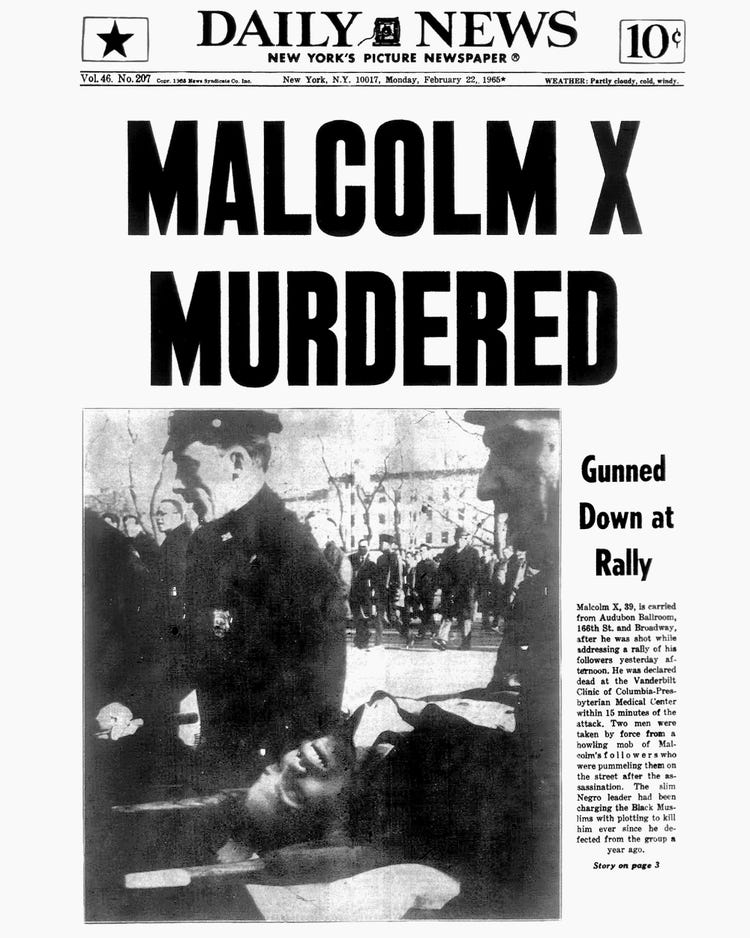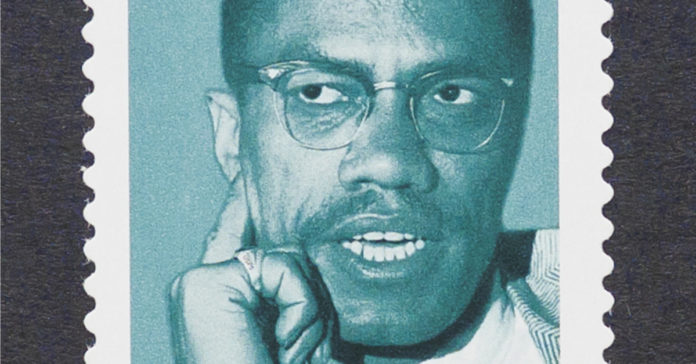On the 95th anniversary of the birth of Malcolm X, Tamim Mobayed looks at how the mainstream media in the U.S. at the time covered the murder of the revered Muslim activist.
One of the reasons why Malcolm X (Malik el-Shabazz) continues to be so widely quoted is because of his incisive use of words and his understanding of the power of communication and the media; it is no coincidence that he was dubbed “the first master of the soundbite”. From among his most popular soundbites is the following:
“The media’s the most powerful entity on earth. They have the power to make the innocent guilty and to make the guilty innocent, and that’s power.”
The way mainstream newspapers in the U.S. reported on Malcolm’s murder belies the morbid reality of this quote – attempts were made to paint him as a hateful racist, with an often explicit suggestion that his murder was deserved or inevitable.
Consequently, questions then arise pertaining to the nature of the media today and whether such unchecked instrumentalisation continues, and who the victims of this might be. While the target of this would primarily be consumers of media, it might be worth considering which voices, organisations and movements are targets of mischaracterisation too.
‘His Gospel was Hatred’
The New York Times (NYT) led with a headline declaring that Malcolm had “lived in two worlds… both bitter”, going on to describe him as an “extraordinary and twisted man, turning many true gifts to evil purpose.” He was juxtaposed with the “responsible leaders of the civil rights movement” as a “ruthless” and “fanatical” believer in violence.
Subscribe to our newsletter and stay updated on the latest news and updates from around the Muslim world!
The Los Angeles Times towed a more strident line, claiming that “hatred for whites obsessed Malcolm.” Crucially, Malcolm’s assassination came around ten months after his paradigm-shifting Hajj, and his well-publicised renunciation of the heretical Nation of Islam’s racism.
Other American media outlets, such as the African American owned Amsterdam News (AN) understood this. Global newspapers did so too; so why was it the mainstream press in the U.S. decided to forget this aspect of his journey when it came to his obituary?
As well as the inaccurate framing of Malcolm as a racist, there were attempts to characterise the murder as an instance of “just deserts.” The NYT claimed his approach had marked him “for a violent end,” while the Saturday Evening Post framed it as an inevitability.

Going further, the NYT claimed that the murderers had emerged from the darkness that “he had spawned.” Responsibility was not to be placed on the U.S.’s criminally malignant racist structures, nor COINTELPRO’s active involvement in fuelling feuds, or even the white supremacists who had murdered Malcolm’s father and denied him the right to a childhood; rather, it was all Malcolm’s own doing.
Prophetically, Malcolm realised that such (mis)constructions would take place in an attempt to deflect from the US’s rabid inequality, as well as to undermine his message and that of the movement:
“He will make use of me dead as he made use of me alive, as a convenient symbol of ‘hatred’- and that will help him to escape facing the truth that all I have been doing is holding up a mirror to reflect, to show the history of unspeakable crimes that his race has committed against my race.”
Another theme drew on racist tropes, comparing Malcolm’s murder to gang activity, “his death resembled a martyrdom less than a gangland execution” – Malcolm had just ten weeks prior given a rousing speech at the Oxford Union.
Not long before that, he had been meeting presidents and heads of states throughout Africa and the Middle East. Most offensively, Time Magazine attempted to construct an indulgent and arrogant Malcolm, by concocting a story that voices such as Malcolm’s late biographer Manning Marable deemed untrue. They told their readers that Malcolm had “characteristically kept his followers waiting for nearly an hour while he lingered over tea and a banana split at a nearby Harlem restaurant.”
Positive coverage
Other voices in the U.S. media afforded Malcolm’s murder the treatment it warranted. Writing in the AN, James Baldwin wrote of the murder as being “a major setback for the Negro movement.” Another piece from the AN opened with a warning that reveals the flavour with which the wider media was treating the assassination: “If you’re looking for some reading material which will help you rejoice about the death of Malcolm X, you’d better turn the page.”
The NYT would later report with an air of curiosity the way in which Malcolm’s death was received within “Asian and African” countries, noting that he was described as an agent of emancipation and anti-segregation, and a martyr on par with “John Brown and Patrice Lumumba.”
By the time it came to reporting on the murder trial at the end of 1965, the NYT had finally managed to realise that Malcolm had rejected racism and racialism on the back of his Hajj pilgrimage – “His last conversion… taught him the brotherhood of all men and the error of his racist ways.”
But are we confident to say that the media has since embarked on significant reform that prevents such misrepresentations occurring?
It would be seemingly naïve to believe so. Recent manifestations, whether driven by conscious or unconscious forces, seemed to overuse imagery of visibly Muslim women within stories reporting on COVID19. Less immediately, studies have shown the propensity within the media to over-report crimes involving Muslims, and under-report crimes committed against Muslims.
Such insights, coupled with the now salient way in which the media attempted to demonise a man who would go on to be vindicated by history, might serve as a reminder of the need for reflection on who and what might the media of today be mischaracterising and misframing.


















